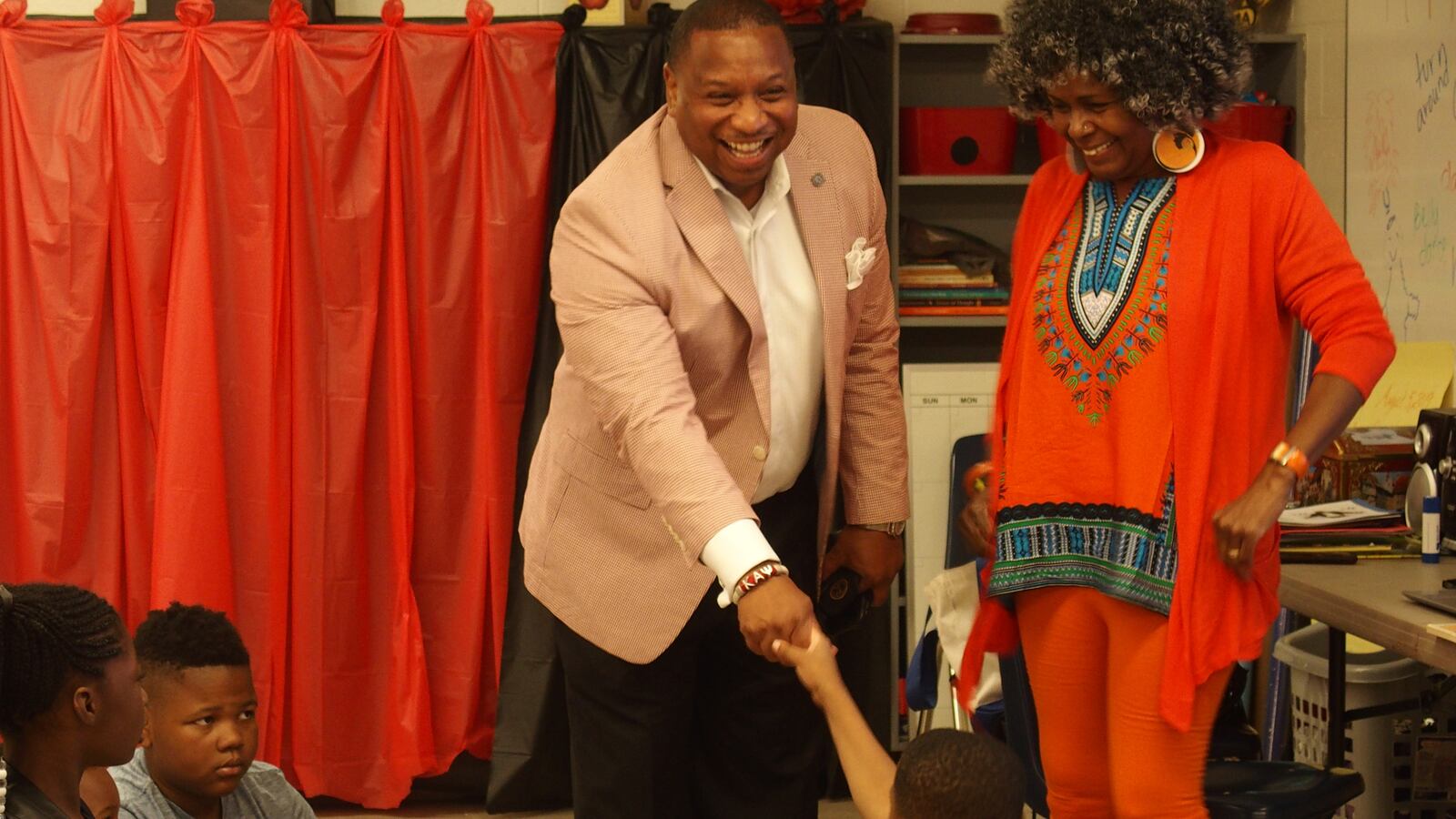As someone who has been a go-to problem solver in his previous roles in Shelby County Schools, Superintendent Joris Ray says he has had a hard time adjusting to the bureaucracy inherent in his new role.
“My pace is this,” he says as he quickly snapped his fingers repeatedly. “But I always want to show deference to the board and ensure that we’re in lockstep. And that’s how you get the best traction when we all move together.”
Ray has been the permanent leader of the Memphis school district for nearly three months — about as long as he was interim leader. Now, Ray is carving out his own initiatives, including one for black male students, which he plans to describe in detail on Monday. Chalkbeat sat down with Ray this week to discuss some of those details, how he hopes to get more students reading on grade level, and how his team plans to respond as students leave to take advantage of the state’s new voucher program by enrolling in private schools.
This interview has been lightly edited for clarity and length.
You’ve talked about launching an initiative for black boys. Can you share your vision for what it will look like?
We’re calling it African-American Male Empowerment. There are some things that we as a school district must do. As superintendent I want to make sure we don’t have exclusionary practices around children, especially African-American males, in our gifted programs and our Advanced Placement courses. They have the lowest graduation rates, highest dropout rates, lowest ACT scores, and highest discipline rates.
I look at it as what we can do differently. It’s not about, in my opinion, changing African-American males, it’s about changing our response to them.
What were some of the underlying causes you found?
It’s about how we view African-American males. I met with a group of students this week from all over Shelby County and I asked them: What image do you see when you’re riding your bike and you think of somebody robbing you? All of them said they saw an African-American male doing it. Then one of the students asked me the same question. And I had to own my implicit bias because I saw what they saw. That’s a narrative we have to change about African-American males. We have to own our implicit bias throughout our school district.
It’s also about our African-American males living in poverty, not having some of the opportunities that their counterparts have to get internships, which goes back to implicit bias. School districts across the nation are quick to put an African-American male in special education, but slow to put them in classes of rigor. Why is that? That’s something we’re still uncovering and trying to figure out.
All 110,000 students are my priority. I’m the youngest of seven and my parents loved us all the same, but equity came in if I needed more attention or more help with homework or if I was sick that day. They did what they had to do for that particular child. And that didn’t mean they didn’t love all of us. As superintendent, I’m looking at the data for African-American males and this particular group is suffering in all areas. It’s my job to figure out what we can do to get better.
Do you support consolidating old buildings and building new ones?

When things make sense to do that, yes. But that’s something you still have to engage the community around. There’s a lot of angst when you talk about closing schools. To me, it’s about the best academic options. When we lead with academic options, our parents get it.
I was at the barbershop talking about if you had three cars and you’re paying notes on all of them. They all have things that are functioning well, but different things that’s broken with all three. Why not go and get you a nice brand new car with everything you need to get you to and from work and some of the other bells and whistles you would like to have? You’d be paying the same note on the brand new car as you would on three separate cars. Same thing with our schools.
When you come to parents that way, it makes sense. But if you come at it as if they’re losing something, our parents aren’t buying into it. It’s about providing quality education throughout all zip codes and providing the best academic options for students.
How is Shelby County Schools preparing for the impact of vouchers?
This is an unknown and uncharted territory for us. But what we can do is share with parents all the options they already have within Shelby County Schools. Many former private school parents are already choosing to go to White State High or Ridgeway or Germantown for International Baccalaureate programs. We want to provide a quality option for their child to get an education and I believe many parents will still choose Shelby County Schools.
The other question is what kind of education are parents going to get with a $7,300 voucher? That’s for the entire year. I’m afraid parents are going to choose a lesser option and the kids will not receive a quality education.
How will district plans to hold back second-graders who aren’t reading on grade level change what happens in classrooms?
I want to be clear, it starts in pre-K. At the end of the day, it’s about our students really understanding and knowing how to read. The incoming kindergarten students will be the first class impacted by the policy. So, we have two years to really look and see what we need to do to make adjustments and get better. I’m the kind of leader that is bold and courageous, but I’m practical. What I feel good about is we give them multiple checks (students must meet eight out of 12 indicators).
Read more about Shelby County Schools’ policy on holding back second grade students

And our teachers are going to receive more high-quality professional development and support with education assistants in each grade.
What makes you think the supports around the retention policy will be the thing that makes the difference for early literacy?
I know one thing: What we’ve been doing hasn’t been working. So we have to try something new and innovative to get our teachers excited about reading, give them support, and raise community awareness around literacy. I sit with superintendents across the state and nation. This is something that’s plaguing school districts. We’re looking to other districts to help with solutions, but we have to tailor it to our students here in Shelby County. I just want to ensure that the public is aware and you have to start reading when the child is in the womb.
Related: Why one Memphis principal reads bedtime stories to students via Facebook Live
I remember when my wife was pregnant with my son. I took out a book every night and I would read to her stomach and to our son. I noticed even as a child when we would read as a 10-month-old, he would look up and take it all in. By the time he was 2 years old, he had his own books and he was attempting to read. If he was on punishment, he would be on his bed with a book enjoying himself. It would drive me crazy.
I want to develop that love and awareness for reading prior to students getting to pre-K. It takes the community to push it in our Sunday school at church, in our community centers, around family dinner tables. Wherever we go, we should be pushing literacy.
How would you describe the role of central office? What changes can people expect?
With student-based budgeting and principals taking more ownership in how money is spent, our central office has to change, but I don’t see it growing. How I see central office is you have to be responsive and everyone needs to be a customer service representative. Central office makes up a small portion of our budget. What I’m trying to do is put systems in place to help us better support schools. That’s what it’s all about.
I do think our human resources department is one department we are taking a strong look at because, to me, human resources is the heartbeat and it controls and helps with the culture and climate of the district. People should feel good about coming to work. I’ve heard from students about how they notice how principals treat teachers trickle down to how teachers treat students. That’s powerful.
Another department I’m taking a hard look at is information technology. We have backpack drives, we should be having laptop drives. And it takes a strong department to really beef up our infrastructure in what we’re trying to do with one-to-one devices.

